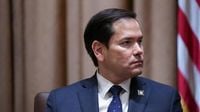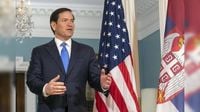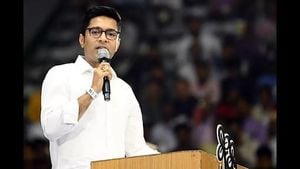On August 17, 2025, United States Secretary of State Marco Rubio made headlines with a pointed statement: the US is keeping a vigilant watch over the tense relationship between India and Pakistan, monitoring the situation "every single day." These remarks, delivered during interviews with NBC News and Fox Business and reported by multiple outlets including PTI, India Today, and India.com, come on the heels of a dramatic four-day military flare-up between the two nuclear-armed neighbors, following India’s Operation Sindoor.
Operation Sindoor, as covered by India.com, was launched by India in response to the April 22 Pahalgam terror attack. The operation targeted nine terror hubs in Pakistan and Pakistan-occupied Jammu and Kashmir (PoJK). The aftermath was immediate and dangerous: Pakistan responded with a barrage of missile launches aimed at 15 Indian cities. In a remarkable display of defense, all incoming missiles were intercepted and destroyed in midair by India’s S-400 "Sudharshan" air defense system, supplied by Russia. The world watched, holding its breath as the specter of escalation loomed large.
In the days that followed, the international diplomatic stage was alive with speculation and claims of mediation. President Donald Trump, never one to shy away from the spotlight, proclaimed on social media that he had brokered a “full and immediate” ceasefire between India and Pakistan after a “long night” of talks mediated by Washington. Since May 10, 2025, Trump has repeated this claim nearly 40 times, according to India.com, touting his administration’s role in diffusing tensions and offering both nations the promise of expanded trade if they kept the peace.
Secretary Rubio, while echoing the administration’s pride in pursuing global peace, offered a more nuanced take. In his NBC News appearance, Rubio stressed the challenges of maintaining ceasefires—especially after protracted conflicts. “Every single day we keep an eye on what’s happening between Pakistan and India, what’s happening between Cambodia and Thailand,” he said, highlighting the US’s broader commitment to monitoring global flashpoints. He continued, “The only way to have a ceasefire is for both sides to agree to stop firing at one another. The Russians just haven’t agreed to that,” drawing a parallel with the ongoing war in Ukraine.
Rubio didn’t mince words about the fragility of such truces. “Ceasefires can fall apart very quickly, especially after a three-and-a-half-year war like what we’re facing now,” he warned, referencing Ukraine. But, he added, “I don’t think anyone disagrees that the ideal here, what we’re aiming for is not some permanent ceasefire. What we’re aiming for here is a peace deal so there’s not a war now and there’s not a war in the future.”
In a separate Fox Business interview, Rubio doubled down on the administration’s peace-first philosophy. “And I think we are very fortunate and blessed and should be thankful to have a President who has made peace and the achievement of peace a priority of his administration. We’ve seen it in Cambodia and Thailand. We’ve seen it in India-Pakistan. We’ve seen it in Rwanda and the DRC. And we’re going to continue to pursue any opportunities we can find to bring about peace in the world,” he said, as quoted by PTI.
But the US administration’s narrative has not gone unchallenged. Both Indian Prime Minister Narendra Modi and External Affairs Minister S. Jaishankar have been unequivocal in their denials of any foreign mediation or influence in the ceasefire or military decisions. In a special session of Parliament regarding Operation Sindoor, Modi stated, “We had said from day one that our action was non-escalatory. No leader in the world asked us to stop Operation Sindoor.” Jaishankar reinforced this, dismissing suggestions of external involvement and clarifying that the ceasefire had no connection to trade negotiations—directly countering Trump’s public assertions.
New Delhi’s stance has been consistent: all issues with Pakistan are to be managed bilaterally, with no room for third-party mediation. This position is rooted in decades of diplomatic principle and was reiterated as international actors, including the US, began making appeals for peace and offering unsolicited opportunities to mediate as tensions escalated. The Indian government’s repeated denials are not just about maintaining sovereignty—they also serve to counteract any implication that domestic decisions are swayed by foreign leaders or linked to economic incentives.
The US, for its part, seems keen to walk a diplomatic tightrope. Rubio’s remarks reflect both the administration’s desire to be seen as a global peacemaker and a recognition of the complex, often intractable nature of international conflicts. He acknowledged that the US has been calling for ceasefires in ongoing wars, but negotiating while hostilities are ongoing is fraught with difficulty. “One of the complications about ceasefires is they have to be maintained, which is very difficult,” Rubio noted, according to India Today.
Interestingly, Rubio’s comments came shortly after a high-profile US-Russia summit in Alaska, where President Trump and Russian President Vladimir Putin reportedly agreed that any peace process—particularly regarding Ukraine—should proceed without requiring a prior ceasefire. This position, supported by Ukraine and its European allies, marks a subtle shift from previous US policy and underscores the evolving nature of global diplomacy.
The India-Pakistan episode, meanwhile, has become a case study in the challenges of conflict resolution in a multipolar world. The international community’s instinct to intervene, the US administration’s eagerness to claim credit, and India’s steadfast insistence on autonomy all played out in real time, watched closely by anxious citizens and wary governments alike.
For now, the ceasefire between India and Pakistan appears to be holding, but the underlying tensions remain unresolved. As Secretary Rubio and others have pointed out, the true test is not simply stopping the guns but forging a lasting peace that addresses the root causes of conflict. Whether the recent events will lead to such an outcome remains to be seen—but one thing is certain: the world will keep watching, every single day.






